
Mt. Fuji at sunset as we landed at Haneda Airport
Japan was on my husband’s bucket list, not mine. How long a pane ride? What about the language barrier? Now I’m so in love with Japan (and sumo wrestling!) I’m pushing to go back. What has stayed with me the most is the thoughtfulness of the Japanese; a unique culture centered on beauty (even the sewer manhole covers are beautiful); how welcomed I felt.
Tokyo is the largest municipality in the world (39+ million), yet it’s eerily quiet. People don’t talk on cell phones in public. Honking car horns are rare. It’s pristine, though trash cans are rare. Everyone is responsible for their own trash. In a three-week visit that covered four cities and the Art Islands, we only saw three people panhandling and no one who appeared homeless. How is that possible with so many people? Why is it the opposite in America?
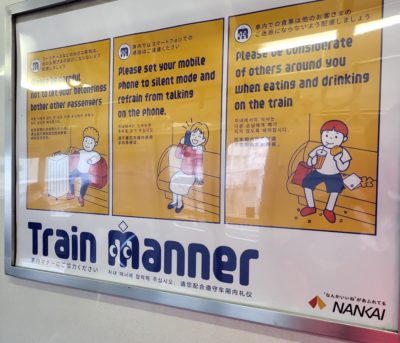
Another observation that rocked me: all signs and train announcements are in Japanese and English. I still needed Google Translate, but not as often as I had imagined. Considering eighty years ago America decimated two major Japanese cities with nuclear bombs and killed around a quarter million people, it’s mindboggling.

Osaka market
When I was a child, the phrase “made in Japan” meant poor quality. For some time now, it’s meant the opposite. Let’s start with their sleek, glorious, punctual, rapid transportation system that serves around 25 billion people a year.

There are lines everywhere in Japan – to eat, buy a ticket, and especially in train stations. Everyone stands patiently, no shoving or cutting in. Stations serving more than 100,000 passengers a day have an extra set of “platform doors” that must open before anyone gets on or off. Accidents do happen, especially with people looking at their phones constantly. No selfie sticks allowed in stations for the same reason.
Each stop has signage in English and Japanese that says what station you just came from, the current one, and the next one. The English announcements are perfectly understandable. In comparison, the New York tri-state train announcements are often indecipherable. (I’m talkin’ to you NJ Transit.)
In Japan there are subway cars just for women so they feel safer and more comfortable.
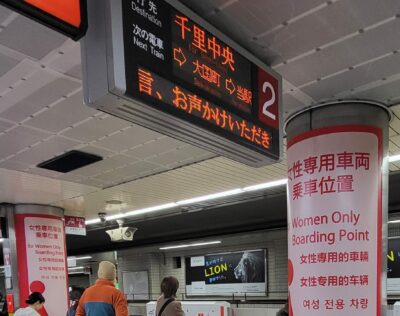
If my husband and I stood in a crowded station bewildered as to where to go, within ten seconds a Japanese passenger who spoke English would offer to help. When I was struggling with a suitcase while going down a long flight of stairs, a young man scooped it up and waited for me at the bottom. He was not expecting a tip. (There’s no tipping in Japan. It’s seen as insulting. Another Wha-?? moment.) I bowed to him many times while saying “Arigatō.” By then it was natural.
Train employees bow before entering each car. Reaching the end, they turn, bow again, and leave. What does that say? To me: “I see you. I appreciate you. I wish you well.”
The old and new co-exist. One moment you’re walking by modern buildings and art so dazzling they have a Disneyland effect and then, boom, you’re standing before an ancient Shinto shrine or Buddhist temple. There is a continual connection to the past and to others that conveys even more respect.
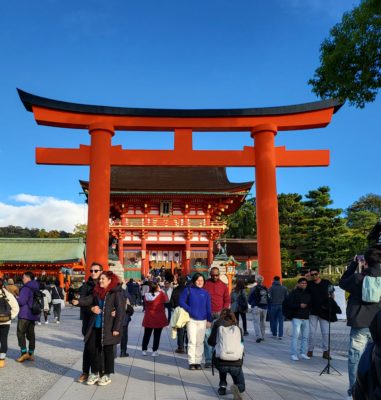

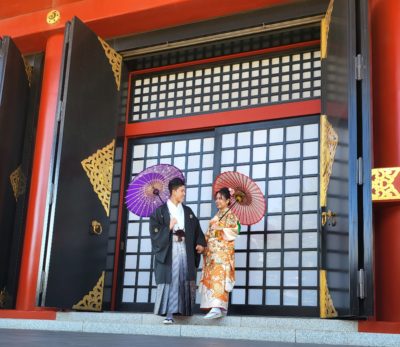

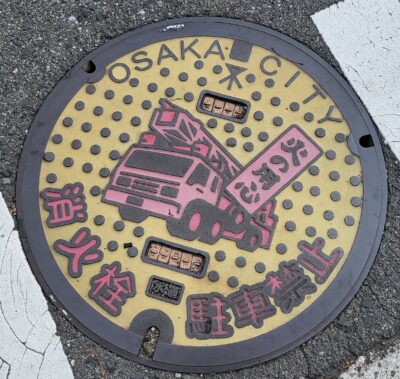

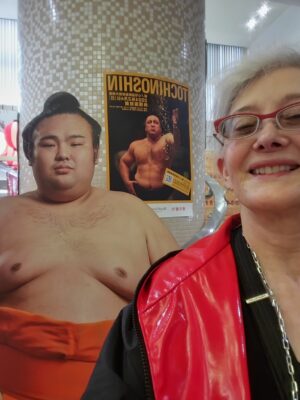
Semi-selfie at 2023 Fukuoka Gram Sumo Tournament with ozeki Takakeisho, now, sadly, retired.
Beyond their impressive mass transit, there are wide yellow lines everywhere to help the blind navigate by “street braille.”
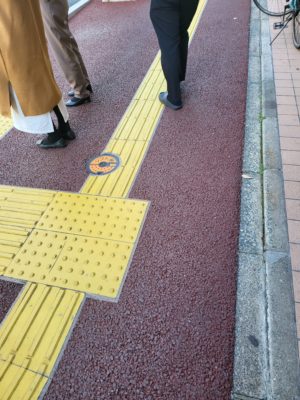
I could go on and on. I’d rather you experience it yourself. Let this remarkable culture slowly reveal itself. Bring its magic back stateside. I still find myself bowing to others. I don’t plan to stop.
The Japanese are not without their problems. They have a population that’s shrinking as well as aging. North Korea poses a nuclear threat. There are earthquakes and tsunamis. National debt. Inflation. A slowing economy. One hot issue these days is reversing the 1912 law requiring all married couples to use one surname. Most of the time the woman takes the man’s last name, but why should it be required to do it at all? A woman keeping her name when she marries is a freedom we take for granted in America.
Still, we could learn a lot from Japan. Perhaps the never-ending strife in other parts of the world should look to them for how to move on and become even better.
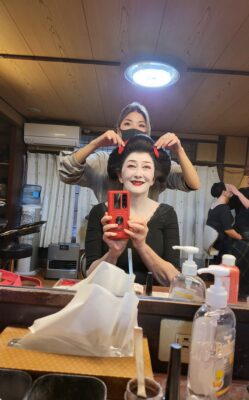
Being transformed into a Japanese maiko (geisha-in-training) at Gion Aya in Kyoto. We saw many Asians and non-Asians dressed this way (and the men as samurais) in photo shoots in the Gion district. It was a lot of fun, but that wig and outfit were heavy!
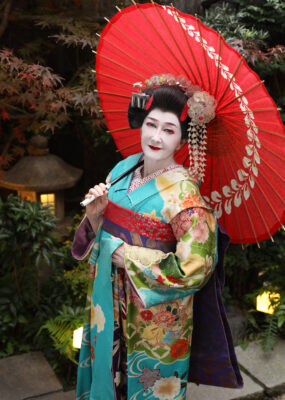
 Renee Poli says
Renee Poli says
January 16, 2025 at 2:52 pmI really enjoyed this story! Thanks for writing it! You are right, I think we could all learn from the Japanese.